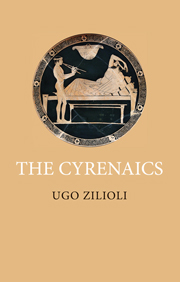Book contents
- Frontmatter
- Contents
- Acknowledgements
- Preface
- Abbreviations and translations
- Dedication
- I History
- II Philosophy
- 4 Indeterminacy
- 5 Persons, objects and knowledge
- 6 Language and meaning
- 7 Pleasure and happiness
- III Conclusion
- Appendix: Cyrenaic testimonies in translation
- Notes
- Further reading
- Bibliography
- Index
7 - Pleasure and happiness
from II - Philosophy
- Frontmatter
- Contents
- Acknowledgements
- Preface
- Abbreviations and translations
- Dedication
- I History
- II Philosophy
- 4 Indeterminacy
- 5 Persons, objects and knowledge
- 6 Language and meaning
- 7 Pleasure and happiness
- III Conclusion
- Appendix: Cyrenaic testimonies in translation
- Notes
- Further reading
- Bibliography
- Index
Summary
As far as Cyrenaic ethics is concerned, the most relevant source is Diogenes Laertius:
The end is not the same as happiness, since the end is particular pleasure [telos men gar einai tēn kata meros ēdonēn], whereas happiness is a collection made out of particular pleasures [eudaimonian de to ek tōn merikōn ēdonōn sustēma]. Among these both past and future pleasures are counted together. Particular pleasure is desirable because of itself. On the other hand, happiness is desirable not because of itself, but because of the particular pleasures.
(II 87–8=T 20)We are immediately given the kernel of Cyrenaic ethics: pleasure is the end and pleasure is desirable in virtue of itself. On the other hand, the importance of happiness is derivative of pleasure, since happiness is not desirable for itself but in virtue of particular pleasures. In light of the predominance of pleasure over happiness, it has been claimed – quite correctly – that the Cyrenaics constitute the only exception to Greek eudaemonism: the view, absolutely central to Greek ethics, that happiness is the end of life. Later, while still endorsing the claim that the Cyrenaics are anti-eudaemonists, I shall restrict the scope of Cyrenaic hedonism by describing the secondary, yet proper role of happiness in the ethics of the Cyrenaics. For the moment, let us concentrate on the kernel of Cyrenaic hedonism, namely on the view that pleasure is the end.
- Type
- Chapter
- Information
- The Cyrenaics , pp. 149 - 170Publisher: Acumen PublishingPrint publication year: 2012

